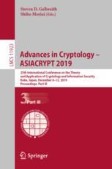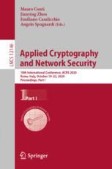Search
Search Results
-
Key-Oblivious Encryption from Isogenies with Application to Accountable Tracing Signatures
Key-oblivious encryption (KOE) is a promising cryptographic primitive that randomizes the public keys of an encryption scheme in an oblivious manner....
-
Traceable Receipt-Free Encryption
CCA-like game-based security definitions capture confidentiality by asking an adversary to distinguish between honestly computed encryptions of...
-
Practical Isogeny-Based Key-Exchange with Optimal Tightness
We exploit the Diffie-Hellman-like structure of CSIDH to build a quantum-resistant authenticated key-exchange algorithm. Our security proof has...
-
Generic Plaintext Equality and Inequality Proofs
Given two ciphertexts generated with a public-key encryption scheme, the problem of plaintext equality consists in determining whether the...
-
Almost Tightly-Secure Re-randomizable and Replayable CCA-Secure Public Key Encryption
Re-randomizable Replayable CCA-secure public key encryption (Rand-RCCA PKE) schemes guarantee security against chosen-ciphertext attacks while...
-
New Limits of Provable Security and Applications to ElGamal Encryption
We provide new results showing that ElGamal encryption cannot be proven CCA1-secure – a long-standing open problem in cryptography. Our result...
-
Privacy-Preserving Digital Vaccine Passport
The global lockdown imposed during the Covid-19 pandemic has resulted in significant social and economic challenges. In an effort to reopen economies...
-
Key Encapsulation Mechanism with Tight Enhanced Security in the Multi-user Setting: Impossibility Result and Optimal Tightness
For Key Encapsulation Mechanism (KEM) deployed in a multi-user setting, an adversary may corrupt some users to learn their secret keys, and obtain...
-
Mix-Nets from Re-randomizable and Replayable CCA-Secure Public-Key Encryption
Mix-nets are protocols that allow a set of senders to send messages anonymously. Faonio et al. (ASIACRYPT’19) showed how to instantiate mix-net...
-
Scalable Cryptography
In our modern digital society, cryptography is vital to protect the secrecy and integrity of transmitted and stored information. Settings like...
-
Structure-Preserving and Re-randomizable RCCA-Secure Public Key Encryption and Its Applications
Re-randomizable RCCA-secure public key encryption (Rand-RCCA PKE) schemes reconcile the property of re-randomizability of the ciphertexts with the...
-
Strongly Anonymous Ratcheted Key Exchange
Anonymity is an (abstract) security goal that is especially important to threatened user groups. Therefore, widely deployed communication protocols...
-
Improving the Efficiency of Re-randomizable and Replayable CCA Secure Public Key Encryption
Public key encryption schemes that are simultaneously re-randomizable and replayable CCA (Rand-RCCA) secure offer a unique combination of...
-
On Instantiating Unleveled Fully-Homomorphic Signatures from Falsifiable Assumptions
We build the first unleveled fully homomorphic signature scheme in the standard model. Our scheme is not constrained by any a-priori bound on the...
-
Traceable Constant-Size Multi-authority Credentials
Many attribute-based anonymous credential (ABC) schemes have been proposed allowing a user to prove the possession of some attributes, anonymously....
-
Practical Round-Optimal Blind Signatures in the ROM from Standard Assumptions
Blind signatures serve as a foundational tool for privacy-preserving applications and have recently seen renewed interest due to new applications in...
-
Powers-of-Tau to the People: Decentralizing Setup Ceremonies
We propose several decentralized ceremonies for constructing a powers-of-tau structured reference string (SRS). Our protocols make use of a...
-
On Instantiating the Algebraic Group Model from Falsifiable Assumptions
We provide a standard-model implementation (of a relaxation) of the algebraic group model (AGM, [Fuchsbauer, Kiltz, Loss, CRYPTO 2018])....
-
On Proving Equivalence Class Signatures Secure from Non-interactive Assumptions
Equivalence class signatures (EQS), introduced by Hanser and Slamanig (AC’14, J. Crypto’19), sign vectors of elements from a bilinear group. Their...
-
Encryption Mechanisms for Receipt-Free and Perfectly Private Verifiable Elections
We design new encryption mechanisms that enable the design of the first universally verifiable voting schemes, supporting both receipt-freeness and...
